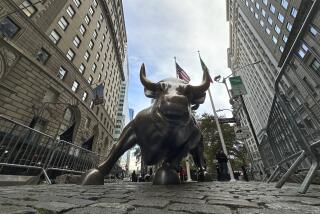Why Oil Spills Don’t Upset Stock Market
- Share via
Whether your viewpoint is that of an investor or a citizen disturbed about oil spills--like the one blotting Orange County beaches--you may wonder why the stock market doesn’t react with outrage and sadness as the public does.
When a tanker ran over its own anchor and spilled 400,000 gallons off Huntington Beach on Feb. 7, the stock of British Petroleum, which chartered the tanker, fell only 37 cents a share to $69.25. Legally, BP is not liable for cleanup costs; the privately owned tanker company and its insurers are. But the giant British firm has acknowledged that it will bear additional costs because of the spill. Yet late last week, BP stock had risen to $70.75 a share, a new 52-week high.
The price movements recalled the slight dip and subsequent recovery of Exxon stock after its Alaska tanker spill last March. Exxon now sells at about $48.50 a share, 15% above its price of a year ago despite having to pay $2 billion in cleanup costs.
Why do oil stocks suffer so little for environmental and public relations disasters? Perverse logic, says Albert Anton Jr., a partner in Carl H. Pforzheimer Inc., an investment firm specializing in oil issues. “Sometimes what’s bad is good; it might create attitudes that will lead to further oil shortages.”
That is, investors see oil spills leading to public outcries against drilling and development of new oil and conclude that the ultimate result will be tighter supplies and higher prices for oil. (Sure enough, the immediate reactions to the latest spill were renewed calls to ban further oil development in California waters and in Alaska). Rising prices, in turn, can mean higher earnings and stock prices for companies that get more for their own oil or for oil that they can buy on long-term contracts from the Organization of Petroleum Exporting Countries.
Emotional reactions to oil spills are understandable, and certainly tanker operators and the oil industry need to raise their standards and practices. But blanket bans on drilling and development only add to a worsening supply situation worldwide.
OPEC--the cartel that pushed prices and nations around in the 1970s--is recovering its power, thanks to declining production elsewhere, particularly the United States and the Soviet Union. (The Soviet Union is the world’s largest oil producer at 12 million barrels a day, the United States is second at 7.6 million and Saudi Arabia third at 5.7 million, although Saudi Arabia has the world’s largest reserves).
The Soviets have also stopped supplying Eastern Europe, which now must buy from OPEC. And because of that East Bloc shift, says analyst Simon Trimble of Shearson Lehman Hutton, oil prices will rise to $30 a barrel in the next few years, 40% above current levels.
That would mean a hike of 30 to 40 cents a gallon for gasoline. And increased clout for OPEC is bound to raise worries about embargoes, shortages and lines at gas pumps.
Oil experts discount the threat of shortage, however. “First of all, there’s no reason to believe you can’t get more oil out of Russia,” says Joseph Tovey of Tovey & Co., a New York investment banking firm. With Western technology and efficiencies, he says, the Russians can get the oil they need to sell for hard currency and consumer goods. Also, Iraq is increasing production, there are signs of oil in Poland and Saudi Arabia has just discovered a gigantic new oil field.
So in the long run there’s plenty of oil in the world. But near-term, demand is catching up with supply and bringing pressure on prices. Craig Schwerdt of Seidler Amdec, a Los Angeles brokerage, sees prices rising faster than general inflation throughout the early 1990s.
It promises to be a good time for the big international oil companies. George Gaspar, analyst for Robert W. Baird & Co., a Milwaukee investment firm, notes that governments in South America and Africa--including once-rich OPEC nations--are offering the companies a share of ownership in the oil produced in exchange for help with new oil development. That’s a throwback to pre-OPEC days.
But it could be a hard decade for U.S. harbors and beaches. A certainty for the ‘90s is that more and more oil will be developed outside the United States, and that means more tankers bringing in imports--and more spills.
Yet a lot can be done to reduce the risk if we think through the problem. First, say oil experts, demand improvements in tankers: double hulls, rigorous personnel standards and speedier emergency procedures. “The oil industry allows far too much looseness in tanker standards and practices,” says a veteran analyst. “It’s disgraceful.”
But then, try to increase domestic production. Don’t equate drilling and pipelines, where accidents are rare, with tankers--where accidents are common. We may as well recognize, as the stock market clearly does, that we’ll be using oil for a long time to come.
More to Read
Sign up for Essential California
The most important California stories and recommendations in your inbox every morning.
You may occasionally receive promotional content from the Los Angeles Times.













